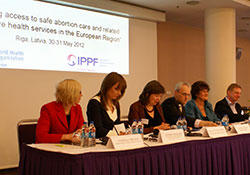Experts meet to discuss safe abortion care

Ministry of Health, Latvia
Unintended pregnancy should be rare, and abortion safe and accessible, said Zsuzsanna Jakab, WHO Regional Director for Europe, at an international meeting on safe abortion care and related reproductive health services, held in Latvia on 30–31 May 2012.
“I firmly believe that together we will find ways to make abortion rare and, when needed, accessible and safe. WHO will continue to support countries in revising their policies and improving the quality of services to prevent unintended pregnancies and unsafe abortion, as well as addressing inequality in health,” said Ms Jakab. She went on to thank the Minister of Health of Latvia for supporting maternal health in the country by declaring 2012 the year of maternal and child health and hosting this important regional meeting.
The meeting was held in Riga, where 100 participants from more than 30 countries and 15 international organizations gathered to improve access to safe abortion in the WHO European Region. The meeting was opened by Latvia’s Minister of Health, Ms Ingrida Circene; Mrs Sandra Roelofs, the First Lady of Georgia and WHO/Europe Goodwill Ambassador for the Health-related Millennium Development Goals; and the Regional Director.
Ms Circene noted that, “in the last 20 years, the incidence of induced abortion has decreased more than fivefold in Latvia. However, the question of prevention of abortion is still topical and particular attention has to be paid to the education of young people of school age, as lack of information is the main reason for unplanned pregnancy and induced abortion among youth.”
Need for further progress
Data reveal substantial declines in abortion rates in the European Region, which has made remarkable progress in improving the prevention of unintended pregnancies and promoting effective contraception and family planning. Nevertheless, millions of women and men still lack access to high-quality information and contraceptive services and supplies. Contraceptive prevalence is directly linked to information, health education in families and schools. Unwanted pregnancy is closely correlated with unsafe abortion and its associated health risks.
Ideally, unwanted pregnancies should be avoided, but knowledge of modern contraception remains limited in some countries. Limited access to means of preventing unintended pregnancy and to safe abortion services results in about 22 million unsafe abortions globally and close to 50 000 maternal deaths each year. In addition, complications cause short-term or lifelong disabilities in about 5 million women.
Draft WHO guidance on safe abortion
WHO is the lead United Nations agency in preventing unsafe abortion, and works closely with partners to support countries in decreasing unmet needs for family planning, especially for vulnerable groups, such as poor and rural populations, adolescents, migrants and ethnic minorities. The European review of the social determinants of health confirms inequalities in health in the Region that include reproductive health. The meeting in Latvia was another important step in the right direction.
At the meeting, WHO/Europe became the first WHO regional office to present the updated version of the WHO guidelines on safe abortion: “Safe abortion: technical and policy guidance for health systems”. The guidance is the result of major efforts by the research community, international partners and WHO.
The meeting was co-hosted by the International Planned Parenthood Federation European Network, WHO’s long-term international partner in improving sexual and reproductive health in Europe.



